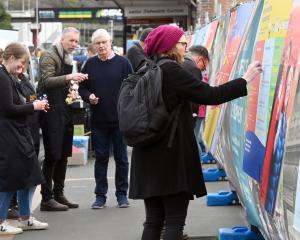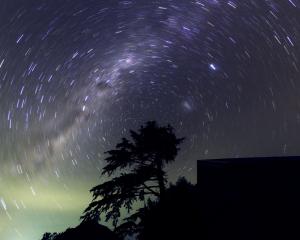The story of Ian and Gloria Hurst's elegant home in North Otago is all about the girl-next-door - and a black chook which unwittingly played Cupid. Sally Rae explains.
The story began in 1865, when Donald Borrie built a cottage at Papakaio.
It was said that the stone was hand-adzed out of the hills.
He had previously sailed to Otago, as a teenager, from Scotland, and met his future bride, Jessie Grant, on the ship, and they initially farmed side-by-side.
At 19, fuelled by a sense of adventure, he got a team of bullocks and a wagon and took supplies to the gold diggings at Dunstan.
Having made some money, he moved north and bought land at Papakaio.
He wed Jessie after building the cottage.
When they outgrew the cottage, following the arrival of eight children, they built the ''big house'' in 1880 - now home to Ian and Gloria Hurst - and two more children were born.
The story went that Donald Borrie carried the two most precious items - the youngest child, a three-month-old baby, and a gilded clock won by his wife at an A and P show for her butter-making prowess - down to their new home.
In 1928, the Borrie family sold Willow Park to Archibald and Jessie Hurst, who moved in with their family of five.
Yet again, it was a story of ''the girl next door''.
Archie Hurst was born in Waimate, while Jessie was born in North Otago.
Archie's mother gave him a black Orpington hen to take from Waimate to a ballot farm at Corriedale - next door to Jessie - so he would have a source of eggs.
Luckily, Jessie had the chook house and, on Sundays, he went to collect the eggs and romance blossomed.
Coincidentally, Ian and Gloria Hurst now have black Orpingtons roaming the garden.
Archie and Jessie Hurst lived at Willow Park until their deaths and then nobody really wanted it, Gloria Hurst recalled.
It had become old and a liability, as could happen with old houses.
While it had been a great family home for two families, it had become ''tired and lonely'', she said.
But then Archie and Jessie Hurst's grandson, Ian, returned to North Otago from Christchurch, with his wife, Gloria, ''full of energy and adventure''.
The former All Black had been at Papakaio School for three months - ''he'd staked his claim on the mat'' - when his future bride started school in the same classroom.
The couple, who married in 1973, decided to take on the challenge of restoring Willow Park.
At that time, they were just keeping pace with what they could afford and they ''patched over old wounds'', one room at a time.
In the 1990s, they embarked on a major renovation project, which resulted in a very stylish, yet comfortable, home.
For more than 30 years, Willow Park has simply been ''home'' for Mr and Mrs Hurst and their three, now adult, children.
''It's a fabulous family home. It looks huge but it's not really. It's a fun place for those of us who live here and also those . . . who come to play,'' Mrs Hurst said.
''Kids come, families come to charge their batteries, and it works.''
The property was always known as Willow Park, but when Mr and Mrs Hurst first arrived, there were no willow trees.
At the time of the house restoration, they also extended the garden and developed ponds, making it more park-like.
With a large expanse of lawn, ponds and gardens, along with established trees, it is a stunning setting.
For Gloria Hurst, with her boundless energy and enthusiasm, it is simply the ''backyard'' and getting back the value of backyards is something that she is passionate about.
''It's so undervalued, the backyard.''
She has a passion for young people and has embraced the establishment of the Waitaki community gardens, getting heavily involved with the project.
At the gardens, it was ''right back to the basics'', learning the magic of life through growing, learning to respect nature, taking time to observe the seasons, listening to each other and, most of all, remembering how to play.
Mrs Hurst is big on play - ''we have to teach people how to play'' - saying she would like to see Oamaru as the ''play centre of the universe''.
Mr and Mrs Hurst saw themselves as the custodians of Willow Park, and had the aim of leaving the property ''a little bit better off'' than the way they found it.
As well as the restoration of their own home, another project they embarked on was the restoration of the cottage that Donald Borrie built back in 1865.
When one end of the stone cottage ''totally fell out'', it meant the Hursts' had to stop and think about its future.
Fortunately, there were some talented craftsmen in Oamaru and they decided to give it the attention it deserved.
A short walk from the Willow Park homestead, the picture-perfect cottage - complete with outdoor bath - is now a delightful space for family and friends to take time out.
''We all love sneaking up here,'' Mrs Hurst said.
It was also a very different place to what it would have been like in the era of Donald and Jessie Borrie.
''They would have been tough times,'' she said.
Mrs Hurst loved her home, saying it had to be a special reason to take her away and it was always a great place to come back to.
Mr Hurst agreed it had been a fun project.
''We have been blessed with the fact there was a core of plantings that took place that we've been able to enjoy and embellish. It was what created the framework to work with.''













